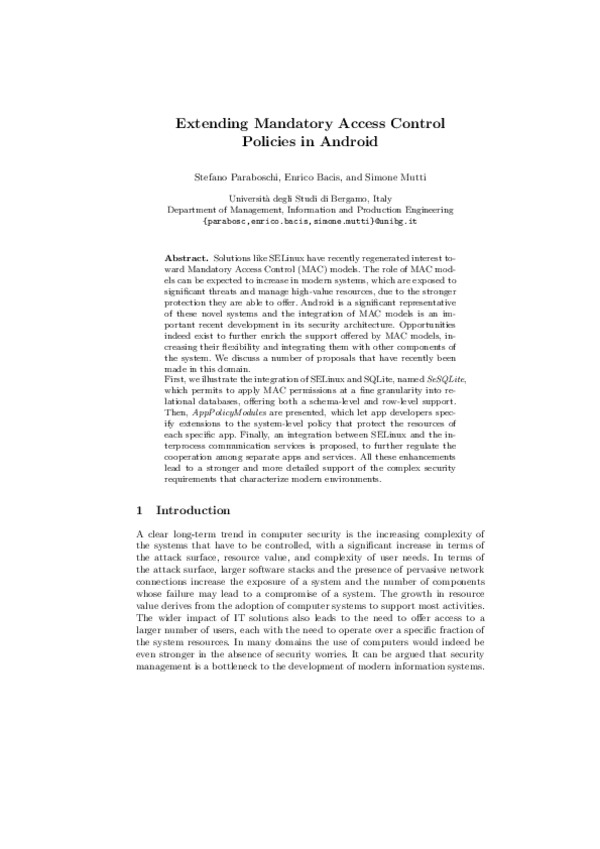Extending Mandatory Access Control Policies in Android
Stefano Paraboschi, Enrico Bacis, Simone Mutti
In Proceedings of the 11th International Conference on Information Systems Security (ICISS)
Solutions like SELinux have recently regenerated interest toward Mandatory Access Control (MAC) models. The role of MAC models can be expected to increase in modern systems, which are exposed to significant threats and manage high-value resources, due to the stronger protection they are able to offer. Android is a significant representative of these novel systems and the integration of MAC models is an important recent development in its security architecture. Opportunities indeed exist to further enrich the support offered by MAC models, increasing their flexibility and integrating them with other components of the system. We discuss a number of proposals that have recently been made in this domain.
First, we illustrate the integration of SELinux and SQLite, named SeSQLite, which permits to apply MAC permissions at a fine granularity into relational databases, offering both a schema-level and row-level support. Then, AppPolicyModules are presented, which let app developers specify extensions to the system-level policy that protect the resources of each specific app. Finally, an integration between SELinux and the interprocess communication services is proposed, to further regulate the cooperation among separate apps and services. All these enhancements lead to a stronger and more detailed support of the complex security requirements that characterize modern environments.
@InProceedings{10.1007/978-3-319-26961-0_3,
author="Paraboschi, Stefano
and Bacis, Enrico
and Mutti, Simone",
editor="Jajoda, Sushil
and Mazumdar, Chandan",
title="Extending Mandatory Access Control Policies in Android",
booktitle="Information Systems Security",
year="2015",
publisher="Springer International Publishing",
address="Cham",
pages="21--35",
abstract="Solutions like SELinux have recently regenerated interest toward Mandatory Access Control (MAC) models. The role of MAC models can be expected to increase in modern systems, which are exposed to significant threats and manage high-value resources, due to the stronger protection they are able to offer. Android is a significant representative of these novel systems and the integration of MAC models is an important recent development in its security architecture. Opportunities indeed exist to further enrich the support offered by MAC models, increasing their flexibility and integrating them with other components of the system. We discuss a number of proposals that have recently been made in this domain.",
isbn="978-3-319-26961-0"
}
